Cadastral surveys and the system of land registration in Madagascar
Resource information
Date of publication
December 1971
Resource Language
ISBN / Resource ID
uneca:10855/9887
Pages
6
"The word cadastre is the technical term signifying the surveying of parcels of land, establishing their area, value and ownership (or any other title of occupancy)". This definition seems to deal only with the topographical aspect of the system, in other words, the demarcation of a group of parcels, with their area, their boundaries and the name of the owner. In Madagascar, in addition to this demarcation, the owner must establish his title by an official instrument.
Publisher(s)
Data Provider
Geographical focus




